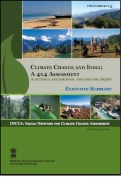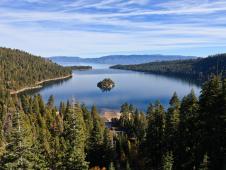Climate Change
Centre for Education and Documentation (CED) is looking for a Researcher based in Bangalore
Posted on 06 Dec, 2010 06:03 PMContent and Image Courtesy: Centre for Education and Documentation (CED)
CED is registered Public Trust, all of whose activities are its information centres, now in Bombay and Bangalore.
Climate change and India - A sectoral and regional analysis for 2030s by the Indian Network for Climate Change Assessment (INCCA)
Posted on 05 Dec, 2010 10:45 AM This report prepared by the Indian Network for Climate Change Assessment (INCCA) provides an assessment of impact of climate change in 2030s on four key sectors of the Indian economy, namely agriculture, water, natural ecosystems & biodiversity and health in four climate sensitive regions of India, namely the Himalayan region, the Western Ghats, the Coastal Area and the North-East Region. This is the for the first time that such a comprehensive, long term assessment has been undertaken based on rigorous scientific analysis for the 2030s (all previous assessments were for the 2070s and beyond).
This report prepared by the Indian Network for Climate Change Assessment (INCCA) provides an assessment of impact of climate change in 2030s on four key sectors of the Indian economy, namely agriculture, water, natural ecosystems & biodiversity and health in four climate sensitive regions of India, namely the Himalayan region, the Western Ghats, the Coastal Area and the North-East Region. This is the for the first time that such a comprehensive, long term assessment has been undertaken based on rigorous scientific analysis for the 2030s (all previous assessments were for the 2070s and beyond).
Water security for India: The external dynamics - An IDSA Task Force Report
Posted on 01 Dec, 2010 08:44 PMThe report by Institute for Defence Studies and Analyses is premised on the fact that India is facing a serious water resource problem and is expected to become 'water stressed' by 2025 and 'water scarce' by 2050. It raises fundamental questions about the forces driving water demand and the political dynamics of riparian relations, both in terms of hindrances and opportunities, amongst states in the subcontinent. Rivers, a crucial source of water resources, physically link upstream and downstream users and at the same time create barriers.
International Conference cum Workshop “Water Partnerships Towards Meeting the Climate Challenge”, CEC, Chennai
Posted on 01 Dec, 2010 04:22 PMOrganizer: Centre of Excellence for Change (CEC)
Venue: Hotel Taj Connemara, Chennai, Tamil Nadu, India
Description:
Water is the climate challenge and it poses a major risk for the water security of the citizens of India. The Challenge varies across States and is eliciting a wide range of responses from the stakeholders at different levels.
NASA study finds earth's lakes are warming
Posted on 01 Dec, 2010 11:14 AM Lake Tahoe, seen here from Emerald Bay, was one of the primary validation sites for the global lake study. Image credit: NASA/JPL-Caltech
Lake Tahoe, seen here from Emerald Bay, was one of the primary validation sites for the global lake study. Image credit: NASA/JPL-Caltech
Peer Water Exchange (PWX) receives 2010 Intel Environment Award
Posted on 29 Nov, 2010 04:40 PM
The Peer Water Exchange (PWX) was awarded the 2010 Intel Environment Award today. PWX, a project of Blue Planet Network, is a combination of process, technology platform, and people designed to unlock the global capacity and creativity of individuals, philanthropies, businesses and implementers to solve the global safe drinking water and sanitation crises.

Seasonal changes in Indian aerosols: Updates from Earth Observatory
Posted on 25 Nov, 2010 12:49 PMIn recent years, scientists have detected very high levels of aerosol pollution in the air over India. Some of it is the result of industrial and agricultural activity, and some of it is nature at work.
News roundup (16-22 November 2010)
Posted on 24 Nov, 2010 10:07 PMSanitation/Wastewater
- India tops the list of nations lacking toilets
- India hunts for a Rural Toilet Design, 1000 Euros up for grabs
- 82% of rural India deprived of three basic necessities of life — tapped drinking water, electricity connection and sanitation
- There are 700 million cell phone connections in India, but only half this number of Indians have access to private toilets, says a UN study
News roundup (8-15 November 2010) :"India proposes a new emission check system" and News round-up on the floods
Posted on 17 Nov, 2010 06:08 PMClimate Change
Environment
Watershed development in India: Biophysical and societal impacts - Research paper from Environ Dev Sustain journal
Posted on 15 Nov, 2010 11:12 PMThe paper argues that watershed management has to be fluid to take into consideration new realities like change in flow conditions, external realities like unintended impacts and the need to maintain minimum downstream flows for environmental and other purposes.





